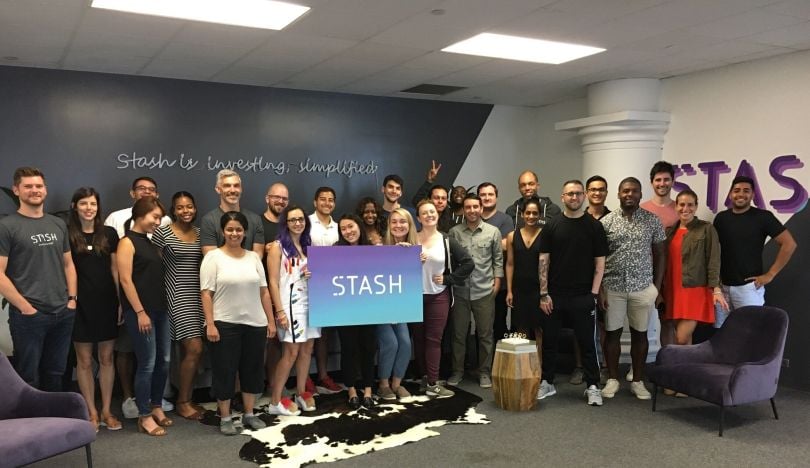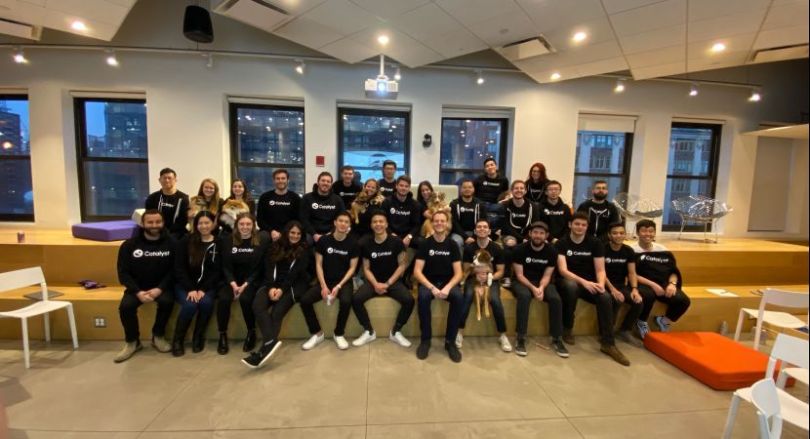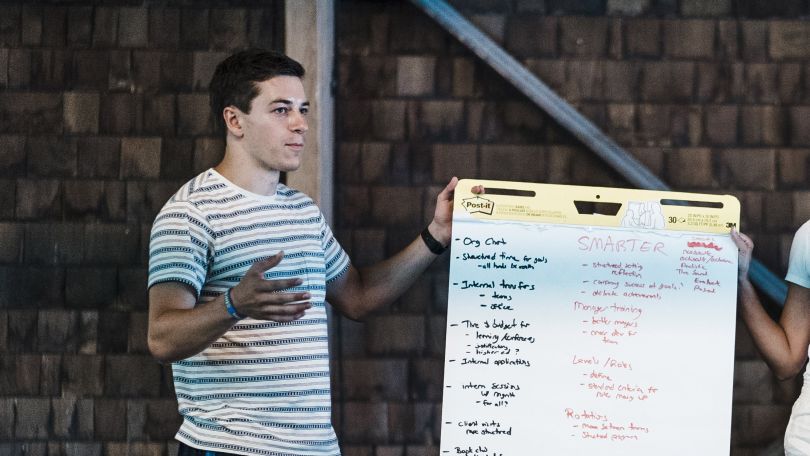It’s easy to find concrete validation when you’re an engineer: Your test either passes or fails. Your code performs its intended purpose or it doesn’t. Your architecture is scalable or it isn’t.
But black and white results aren’t always possible for engineering managers, most of whom were former engineers themselves but are now in charge of leading teams.
“People and their problems aren’t necessarily as solvable,” said Annyce Davis, director of engineering at Meetup, who still misses her coding days.
Instead of digging into code, Davis now oversees sprints. Rather than finding a solution to a difficult problem herself and celebrating her own victories, she guides her team to achieve those tasks.
“As a manager, I needed to learn a new way to feel accomplished at the end of the day,” Davis said. “I now reflect on positive interactions with my colleagues, a great one-on-one or a team delivering a new feature. These are the ways that I measure my success now.”
For many engineers like Davis, it can be a tricky jump to a managerial position. The job requires a very different set of skills. Built In spoke with eight New York City engineering managers to learn more about their transitions into the new roles, what challenges they faced, how they adapted and any advice they’d provide to an engineer thinking about making the same switch.

When Cliff Hazelton made the switch to a managerial role at Stash, a New York-based fintech company, the hardest part was resisting his past habits of software development. His responsibilities had changed, so he researched and practiced the skills that make successful managers.
What was one challenge you faced during the transition from individual contributor to engineering manager?
When I shifted to management, I was uncertain if the work I was doing was having a positive or negative outcome toward an objective. People management is not as clear-cut as being a developer. The expectation that I act as a leader for my team and the organization required a level of confidence and comfort that I didn't have yet in this completely new role.
How did you overcome this challenge, and how has it shaped your approach to management?
The first step for me was accepting that I had transitioned into a new role. I had to actively avoid the temptation of falling back into old habits of pure software development. Overcoming that mindset meant learning and practicing the skills that make successful managers: giving and receiving feedback (and helping others do the same), practicing soft skills, being a strong mentor (or finding the right mentor for team members), practicing rigorous time management and putting team success ahead of all else.
What's the most important piece of advice you'd give to someone who is transitioning into their first engineering manager role?
The best thing you can do to succeed as a manager is to aggregate as much information about engineering management as possible. Read books and budget some time for yourself to learn more about the role and how it differs from organization to organization. Get involved in peer networks so you can have discussions outside of your organization with people who are in the same role, but with different levels of experience. Most importantly, invest the time in learning the best way to support the members of your team.

After Chris Neugebauer became an engineering manager at AlphaSights, a professional services company, he realized his motivations had changed. Instead of finding joy out of solving a coding problem, he sought the moments where he could guide his team members to their own successes.
What was one challenge you faced during the transition from individual contributor to engineering manager?
The biggest challenge for me was discovering that what I was accountable for had suddenly changed. I went from being responsible for the delivery of features and systems to the delivery of entire projects, as well as the work output of each person on my team. This change also shifted the nature of how I reported to the organization and the frequency of meetings with my manager in ways I didn’t expect. The way I interacted with the organization became less about what the job decided for me, and instead turned into something I had to manage for myself.
How did you overcome this challenge, and how has it shaped your approach to management?
I made sure that I kept up a regular cadence of meetings with people I needed to be accountable to and accountable for. I also increased the number of meetings I had with my manager. I kept fortnightly one-on-one meetings to discuss my own career growth, performance and responsibilities, but also added weekly meetings to talk about the team and our progress on projects.
What's the most important piece of advice you'd give to someone who is transitioning into their first engineering manager role?
Before you start the role, understand how your new role will be different from your old one, because it will be different. What surprised me most was how the motivation for my work changed. I went from working on projects and finding motivation in delivering new features and systems, to finding motivation through guiding others to do their best work. Good managers need to find satisfaction in helping other people do good work and growing in their careers because that’s the majority of the job.

Annyce Davis still misses coding. As the director of engineering at Meetup, a service that organizes online groups to host in-person events for people with similar interests, she’s found ways to discover the joys of her new position, like mentoring her team and helping her colleagues succeed.
What was one challenge you faced during the transition from individual contributor to engineering manager?
I’m unable to get into the code and make a meaningful difference there anymore; I affect change by helping others do what I used to. This shift has been a bit emotional. I love programming. For me, programming is understandable, and there is always a solution to a problem. People and their problems aren’t necessarily as solvable.
Humans are complex organisms that present all manner of challenges. There isn’t always a right answer. At times, there’s only the best answer for right now. Learning to be OK with that took some time. Even now, I’m constantly presented with new situations that require finesse and insight to navigate. Let’s just say that being an engineering manager never gets boring.
How did you overcome this challenge, and how has it shaped your approach to management?
To be honest, it was and still is a gradual process. There was no lightbulb moment — just small adjustments in my thinking. I needed to learn a new way to feel accomplished at the end of the day. I now reflect on positive interactions with my colleagues, a great one-on-one, a team delivering a new feature. These are the ways that I measure my success now.
Additionally, I decided to learn how to manage the same way I would pick up a new software framework. I signed up for newsletters, subscribed to podcasts, read several books and joined a management Slack group. Then little by little, I would put into practice the new things that I was learning. Like the types of questions to ask during a one-on-one, or how to structure a meeting when a decision needs to be made versus one where the desired outcome is a list of next steps. It felt great to watch my efforts pay off.
What's the most important piece of advice you'd give to someone who is transitioning into their first engineering manager role?
Each person is different. They need different levels of mentorship, coaching and support. You will encounter situations where you won’t know what to do. That’s OK. It’s normal. But don’t stay stuck. Form a network of fellow engineering managers and tap into the reservoir of knowledge that they possess.
Humans are complex organisms that present all manner of challenges. There isn’t always a right answer.”
I remember dealing with a really tough situation at work one day. I reached out to my network and the outpouring of support along with actionable advice helped me get through it. More importantly, it allowed me to show up for my team as the leader they needed. Don’t underestimate the power of community in helping you to transition successfully into this new, exciting role.

Linda Zhou found that the best way to transition into her managerial role at Catalyst, a New York City software tech company, was to over-communicate. That meant setting up one-on-one meetings with her team and other managers to learn their goals, motivations and how they work best.
What was one challenge you faced during the transition from individual contributor to engineering manager?
A big, unanticipated shift for me was the change in how I managed upward and across functions. When I advocated for changes before I became an engineering manager, it was mostly centered on my personal experiences. Now, I’m advocating for my team. I need to communicate the difficulties we face and the specific support we need from the larger engineering team and other organizations at the company.
How did you overcome this challenge, and how has it shaped your approach to management?
The way I combat this is through an emphasis on collaboration and over-communication. I work closely with my product manager to understand the problem we're solving. I push back hard on external deadlines and I always ask a lot of questions to understand what the expectation is for what we need to deliver. I also make a point of communicating my team's plans on a regular basis to be sure that our approach makes sense.
Within the team, I share any information as soon as I have it. In doing so, I encourage them to engage with the problems we're solving and feel confident that they have the context to make suggestions and decisions about their work.
What's the most important piece of advice you'd give to someone who is transitioning into their first engineering manager role, and why?
Talk to every member of the team, including anyone who may not be reporting to you, and listen closely to what they have to say. See if they feel any anxiety around the transition and find out what they're excited about. Understand how they work best, how they like to collaborate and how they give and receive feedback. Ask what motivates them and what their goals are. Make being available to your team your top priority. If you don't take the time to build a strong foundation and shared trust at the start, you may not have the opportunity later.

Matthew McNaughton’s transition to a managerial role was a bit more unique. He acts as a player-coach for the engineering team at Flatiron Health, a healthtech company in New York City, where he manages the staff while also working on the development side.
What was one challenge you faced during the transition from individual contributor to engineering manager?
When I transitioned to engineering management, my team was — and still is — quite small (three engineers including myself). So as a new manager, I needed to prioritize one-on-ones with the folks I managed and collaborated with, while also making myself available for pairing, design sessions and so on. For our team to be effective, I felt it was important for me to continue making individual technical contributions. My biggest challenge was time — how can I be an effective manager for my team, but still make meaningful technical contributions?
How did you overcome this challenge, and how has it shaped your approach to management?
I still find this to be a challenge sometimes. However, I’ve found that I'm most successful in striking the right balance when I can be intentional with my calendar and focused with my attention. I'm a big advocate of Cal Newport's "Deep Work" philosophy, which essentially recommends carving out large chunks of time in which I focus on the most important, challenging task for the day. Most often that's a technical problem, be it a design document or hands-on keyboard coding, but it can also be a managerial challenge. During my "Deep Work" window, I try to remove as many distractions as possible.
What's the most important piece of advice you'd give to someone who is transitioning into their first engineering manager role?
One of my most important tasks as a manager is ensuring that both my team and the folks my team collaborate with understand why we are doing what we are doing. At Flatiron, this process boils down to thinking about how each action will help achieve our mission: to improve lives by learning from the experience of every cancer patient. If we're doing something, small or large, for which my team can't answer that question, then I've failed in one of my duties as a manager.

When Alvaro Morales became an engineering manager at Asana, a productivity and software tech company, he used an easily available resource to help him navigate the new role: his peers. That support not only helped him professionally, but taught him ways to become a mentor himself.
What was one challenge you faced during the transition from individual contributor to engineering manager?
Asana engineers take responsibility for their own growth and empower themselves to become better engineers. The biggest challenge I faced was adapting to significantly longer feedback loops in the work that we do as managers. As a manager, it takes much longer to see the effect of the work that we do. I might need to wait until the next review cycle or engagement survey to get a signal on whether the things I’m trying out are working. This is a pretty common challenge among those new to this role.
How did you overcome this challenge, and how has it shaped your approach to management?
Part of it was just giving myself time to settle into the new role and recalibrating my internal reward function to adjust to longer feedback loops. But this also inspired me to approach my management work in a more structured way by finding opportunities to create more checkpoints for myself and shorten the feedback cycles. I make an effort to ask for feedback early and often.
What's the most important piece of advice you'd give to someone who is transitioning into their first engineering manager role?
Lean on your peers to help you navigate the role transition, and get support from your own manager. We place a huge emphasis on mentorship at Asana. Not only do people care about mentoring others, we believe that everyone brings unique knowledge and experience which they can impart to others. It’s helpful to problem solve with another manager when faced with a new situation, or have a conversation about how the new role is different and challenging. Other teammates have been in your shoes before, and seeking out their perspective will make you feel more supported in the transition.
As a manager, it takes much longer to see the effect of the work that we do.”

What helped Kenny Chen transition into his managerial role at DigitalOcean, a cloud and enterprise web tech company, was a test run. Before he made the jump, he was able to run a project and manage a group of engineers, which gave him a taste of what being a manager would be like.
What was one challenge you faced during the transition from individual contributor to engineering manager?
There were several challenges when I transitioned from an individual contributor engineer to a manager, as it’s a completely different role. The biggest was getting used to doing all the planning and prioritization. As an engineer, this is all done for you at the start of a quarter. But as a manager, you need to plan out all of the priorities for the next sprint. It can be daunting at first as you may not have all the context when you get started.
How did you overcome this challenge, and how has it shaped your approach to management?
I was able to lean on my tech lead and product manager for insight and direction as I got up to speed. Gathering more context required reading a lot of our documentation and meeting with stakeholders to ensure we were working on the right things and prioritizing correctly.
What's the most important piece of advice you'd give to someone who is transitioning into their first engineering manager role?
Try to get some experience before you start the new role. Have your manager let you run a project, involve you in the planning or manage some interns if your company has them. This helped me get a small taste of what’s involved.

When David Caudill became the director of technical operations at ActionIQ, a marketing tech and software company, it wasn’t his first time in a managerial role. He’d been a tech lead in the past and knew the importance of relationships and providing support to team members.
What was one challenge you faced during the transition from individual contributor to engineering manager?
Managing people is always difficult, but the biggest challenge in the transition is surviving the middle. For most in engineering, this is a tech lead role. In many cases, these roles come with the difficult combination of ambiguous authority, ambiguous responsibilities and meaningful accountability. This mix can make for high pressure jobs where you're accountable as a project manager — roles where your influence results from organizational relationships and trust. When I mentor people, I always make it clear to them that this transition period has the potential to be the most risky inflection point in their careers.
How did you overcome this challenge, and how has it shaped your approach to management?
I fell flat on my face in my first tech lead role, so badly that I just gave up on management. It took years before I circled back. What I learned from that experience was how varied, complicated and political these roles can be in larger environments. I learned just how much support I need to provide for tech leads in my organization. Now I start every new job by ensuring that I've built meaningful relationships with the folks around me — that I’ve shown vulnerability, been comfortable being wrong, listened to their problems and done something about them. I then move very deliberately toward what I am accountable for. This establishes me as someone trustworthy and helpful with the authority and accountability necessary to do my job.
What's the most important piece of advice you'd give to someone who is transitioning into their first engineering manager role, and why?
Understand why you believe this is a good career choice for you. Write that down, and revisit it periodically when things get tough. Don’t depend on external validation for this choice – think about your values, the influence you want to have on the people who report to you and your industry. Feedback loops can be slow for managers — there will be a lot of self-doubt, and when you make mistakes it can sometimes take a long time to realize it. There aren’t a lot of “closing the ticket” dopamine hits, but the job is satisfying long-term. Your influence might be felt in the six-month or one-year timeframe, not this sprint.













